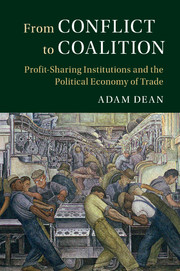Book contents
- Frontmatter
- Dedication
- Contents
- List of Figures
- List of Tables
- Acknowledgments
- 1 Introduction
- 2 A Theory of Profit-Sharing Institutions
- 3 Evidence and Research Design
- 4 The Gilded Wage: Trade Politics in the American Textile and Steel Industries
- 5 Liberalized by Labor
- 6 Trade Politics in Britain and Argentina
- 7 Power Over Profits
- 8 Conclusion
- References
- Index
- Miscellaneous Endmatter
5 - Liberalized by Labor
Published online by Cambridge University Press: 05 September 2016
- Frontmatter
- Dedication
- Contents
- List of Figures
- List of Tables
- Acknowledgments
- 1 Introduction
- 2 A Theory of Profit-Sharing Institutions
- 3 Evidence and Research Design
- 4 The Gilded Wage: Trade Politics in the American Textile and Steel Industries
- 5 Liberalized by Labor
- 6 Trade Politics in Britain and Argentina
- 7 Power Over Profits
- 8 Conclusion
- References
- Index
- Miscellaneous Endmatter
Summary
This chapter explores the influence of profit-sharing institutions on American trade politics in the 1930s and 1940s. It begins by demonstrating the effect of profit-sharing institutions on the trade policy preferences of the American Federation of Labor (AFL) and the Congress of Industrial Organizations (CIO). Throughout this period, the AFL maintained profit-sharing institutions and joined their import-competing employers in favor of high tariffs. In contrast, the CIO did not establish profit-sharing institutions until the early 1940s. Before this, the CIO disagreed with their export-oriented employers concerning trade policy; however, after the creation of profit-sharing institutions, the CIO joined their employers in favor of free trade. The evolution of profit-sharing institutions and the trade policy preferences of the AFL and the CIO are displayed below in Table 5.1.
After demonstrating the effect of profit-sharing institutions on capital-labor trade policy agreement, this chapter uses quantitative methods and an original dataset to demonstrate that these cross-class coalitions influenced the 1945 renewal of the Reciprocal Trade Agreements Act (RTAA). The AFL's cross-class coalition successfully pressured U.S. senators to vote against the RTAA, while the CIO's cross-class coalition successfully pressured them to vote in favor of the RTAA. Most importantly, the CIO's free trade demands convinced protectionist Republicans to support RTAA renewal, therefore helping to establish bipartisan Senate support for free trade. Without this “Republican conversion” to free trade, the RTAA would likely have been dismantled when protectionist Republicans returned to power in 1946. In this way, profit-sharing institutions played a major, but previously unrecognized, role in postwar American trade liberalization.
This chapter will be organized in the following way. The first section follows the same structured-focused approach as the previous chapter. It explores conditions in the labor market during the 1930s, followed by the trade policy preferences of both the AFL and CIO during this period. It then explores the process through which the New Deal led to the creation of profit-sharing institutions and a subsequent change in the CIO's trade policy preferences. The second section begins with a review of the broad literature on the RTAA and the determinants of American trade liberalization following World War II. It then presents my argument that American trade liberalization was sustained by the CIO's endorsement of free trade.
- Type
- Chapter
- Information
- From Conflict to CoalitionProfit-Sharing Institutions and the Political Economy of Trade, pp. 100 - 137Publisher: Cambridge University PressPrint publication year: 2016

